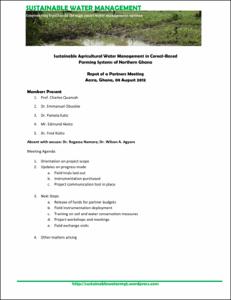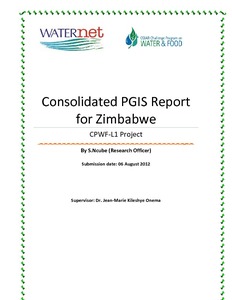Sustainable agricultural water management in cereal-based farming systems of northern Ghana: Report of a Partners Meeting, Accra, Ghana, 8 August 2012
Consolidated PGIS Report for Zimbabwe
In Zimbabwe, the Participatory Geographic Information Systems (PGIS) data collection exercise for the Challenge Program on Water and Food (CPWF?L1) was done in three districts that fall within the confines of the Limpopo River Basin. These districts are Insiza, Matobo and Gwanda which are all found in Zimbabwe’s Matabeleland South province. In all the districts data collection was done at two levels, in which the first level entailed conducting interviews and focused group discussions with the district stakeholders.
Morocco - Oum Er Rbia Irrigated Agricultural Modernization Project : Helping Farmers Increase Productivity
This operation provides a $70m loan for
a project that would help participating farmers in the Oum
Er Rbia basin increase the productivity of their farming and
to promote more sustainable use of irrigation water to
overcome current and future water deficits. This would be
achieved by providing participating farmers with the level
of irrigation service necessary for high efficiency drip
irrigation. Scarcity and degradation of water resources have
Climate Variability and Water Resources in Kenya : The Economic Cost of Inadequate Management
Eighty percent of Kenya is arid and
semi-arid land; yet despite chronic water scarcity, the
country has developed only 15 percent of its available safe
water resources. Demand for water is expected to rise, owing
to population increases and growing requirements for
irrigated agriculture, urban and rural populations,
industries, livestock, and hydropower. Meanwhile, climate
variability and the steady degradation of water resources
Climate Policy Processes, Local Institutions, and Adaptation Actions : Mechanisms of Translation and Influence
This paper focuses on the experience of
the national-level adaptation planning efforts and the
lessons that can be derived for more effective adaptation
from an examination of local governance of development and
natural resources. After examining national level adaptation
plans, particularly the NAPAs (National Adaptation
Programmes of Action), the paper analyzes the range of
institutional instruments and relationships visible in
Making the Most of Scarcity : Accountability for Better Water Management in the Middle East and North Africa
Most of the Middle East and North Africa
(MENA) cannot meet current water demand. Many countries face
full-blown crises, and the situation is likely to get even
worse. Estimates show that per capita water availability
will be cut in half by 2050, with serious consequences for
aquifers and natural hydrological systems. Demand for water
supplies and irrigation services will change as economies
grow and populations increase, with an attendant need to
Public-Private Partnerships to Reform Urban Water Utilities in Western and Central Africa
Western and Central Africa have lengthy
experience with public-private partnerships (PPPs), both for
water supply and for combined power and water supply
utilities. Cote d'Ivoire's successful PPP dates
from 1959, and, over the last two decades, as many as 15 out
of 23 countries in the region have experimented with PPPs.
Eleven PPPs are studied here, and detailed performance
indicators are reported for six large cases-Cote
Rural Watershed Management : The Power of Integration
A watershed is an area that supplies
water by surface or subsurface flow to a drainage system or
body of water. Watersheds vary from a few hectares to
thousands of square kilometers. Watershed management (WSM)
is the integrated use of land, vegetation, and water in a
specific drainage area with the objective of conserving
hydrologic services and reducing or avoiding damage
downstream or underground. The first generation of WSM
Poverty Analysis in Agricultural Water Operations of the World Bank
Agricultural water has been seen as a
prime mechanism for fostering rural economic growth and
reducing rural poverty. But agricultural water has
encountered problems of performance, profitability and
sustainability. This resulted in a reduction in investments
from governments and lending from development organizations
like the World Bank up to early 2000s. A sourcebook on
improving poverty reduction performance of agricultural
Improving Water Security for Sustaining Livelihoods and Growth in Tanzania
The Tanzania Water Resources Assistance
Strategy (TWRAS) illustrates that food security, energy
security, environmental security, health security,
industrial security, and social and economic security all
hinge directly or indirectly on water security. The
cooperative management and development of rivers, lakes, and
aquifers shared with other nations also have significant
implications for national security. The TWRAS has guided the
Competition or Cooperation? A New Era for Agricultural Water Management
Reliable supplies of water for
agriculture have helped meet rapidly rising demand for food
in developing countries, making farms more profitable,
reducing poverty, and helping vast regions of the world
develop more dynamic and diversified economies. Can these
successes be sustained with demand for food rising and water
resources waning? That is the challenge now facing policy
makers, planners, and practitioners in agricultural water




